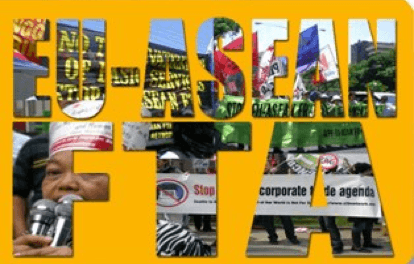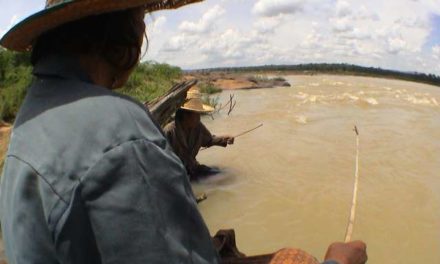The aim of this update from Geneva is to give a quick snap shot of the state
of play surrounding the ongoing negotiations during the General Council (GC)
of the WTO. The information in this bulletin is from the daily briefings at
the General Council of Peoples (which is the parallel civil society meeting
organised by the Geneva Peoples Alliance from 27-29 July 2005).
TRADE NEGOTIATIONS COMMITTEE MEETING (TNC): stalemate continues_
The TNC met yesterday to hear a number of reports including one from
Director General Supachai on his consultative process on outstanding
implementation issues as well as reports from the chairpersons of
agriculture, NAMA, services, and the dispute settlement body. Consistent
with earlier assessments, the general message from TNC meetings is that the
negotiations remain stalled with no progress in many of the issues on the
negotiating table. On agriculture, Chair Tim Groser_s much anticipated paper
presented nothing new. Entitled _Looking Forward to the Hong Kong
Ministerial_ the report was an attempt on the Chair_s part to present the
fact that the negotiations on agriculture are stalled and yet at the same
time identify crucial decision points where, as he said, _clear political
decisions_ would have to be taken to restart the negotiations and pave the
On market access in agriculture, unlike previous assessments of a
convergence on the G20 proposal, the report also recognized the reservations
expressed by some Members. The G10 (a group of countries with protectionist
interest in agriculture) has expressed its opposition to the proposal,
particularly on the issue of maximum tariff rates or caps, an integral
element of the G20 proposal. The US EU game on their interpretations of the
G20 proposal on this continues (see Update # 1).
there is still a stalemate over issues concerning food aid and state trading
enterprises (STE). Neither has there been any substantive progress on SP and
SSM. In an attempt to move ahead the negotiation on this matter, the G33 is
trying to come up with indicators necessary for defining product coverage.
he saw as growing support for the Swiss Formula for tariff reduction and
increasing convergence around a non-linear approach to treat unbound
tariffs. However, the Chair_s interpretation regarding the Formula was
strongly rejected by India and Kenya.
Developed countries have all made offers while 24 developing countries are
still to make their initial offers. Of the 24, South Africa and Venezuela
have been identified as critical to the negotiations. It is expected that
strong pressures would be exerted on these two countries as the services
negotiations move forward. Countries with offensive positions are seeking a
new deadline, if possible with benchmarks to measure the _quality_ of the
offers. It is expected the QUAD countries would set their own benchmarks and
would most likely use these to negotiate with other countries.
the WTO, was the 217-215 vote in the US Congress in favor of the CAFTA
(Central American Free Trade Agreement). With the win on CAFTA, some feel
that the US would now push for intensification of the talks.
While the discussions on the substantive aspects remain lackluster, a number
of developments on process and structure are worth watching. The incoming
New Zealand Ambassador Crawford Falconer will now replace Tim Groser as
Chair of the Agriculture Committee. Together with Pascal Lamy who will
assume the Director General post as of 1st of September, they are expected
to play a crucial role in driving the Agriculture negotiations full speed
ahead in the coming months. In his stint as the EU Trade Commissioner, Lamy
was known for his valiant defense of the EU_s CAP (Common Agriculture
Policy). It will be interesting to see how he wears his new hat.
Another impetus to push the negotiations forward not just on agriculture is
the increasing interaction between the US, EU, Brazil and India, now
referred to as the new QUAD (the QUAD are 4 most powerful countries in the
WTO _ US, EU, Canada and Japan) or the QUIPS (the acronym is supposedly a
combination of FIPS and QUAD). A QUIPS meeting has been scheduled for
September.
Protest actions continued yesterday adding life to what was otherwise an
uninteresting day in Geneva. Around 20 people mostly from the Seattle to
Brussels network (a European network working on WTO issues) staged a
demonstration in front of the EC Building protesting the control of
corporate lobbies over the EU. EU Trade Commissioner Peter Mandelson was
greeted with a giant Peter Mandelson puppet controlled by strings being
pulled by huge corporations. The stunt almost did not materialize as the
Swiss Police earlier prevented the activists from proceeding to the EC
building.
In a session at the General Council of the People, European groups
comprehensively exposed the EU_s corporate agenda on NAMA and services.
While the initial rhetoric post-Doha was that this was a development round,
it is now clear from EU Trade Commissioner Mandelson_s statements that this
round is a pro-corporate one and the European Commission_s (EC) primary role
would be to open up markets in the south for its corporations. There are
over 15,000 lobbyists in Brussels, the seat of the EC. When questioned by an
activist on how exactly lobbying works in Brussels, one lobbyist confessed
_We don_t need to do much_ when the Director General of Trade wants to frame
a request on GATS he just calls us up and asks me want I want._
The meeting ended at 1pm and the members thanked outgoing DG Supachai.
Pascal Lamy made an appearance as DG designate and announced his Deputy DG_s
which include the Ambassadors of Chile and Rwanda. The Jamaican Ambassador
made a highly critical intervention where he stated that _development_ was
sadly lacking in this new round. This was reiterated in the intervention
made by the Kenyan Ambassador.
In his final formal address to the Membership Supachai stressed the need for
checkpoints in the road to Hong Kong. A number of crucial meetings will take
place from now until the Ministerial meeting. Besides the G20 (possibly
together with the G33) meeting in Pakistan in September, there will be a
mini-Ministerial meeting most probably in Geneva in early October, and the
General Council Meeting, also in Geneva, on 19 – 20 October.
Despite the disappointment over the GC failure members reiterated their
commitment to the Doha work programme.
Jacques-chai Chomthongdi – [email protected]
In India: Benny Kuruvilla _ [email protected]








